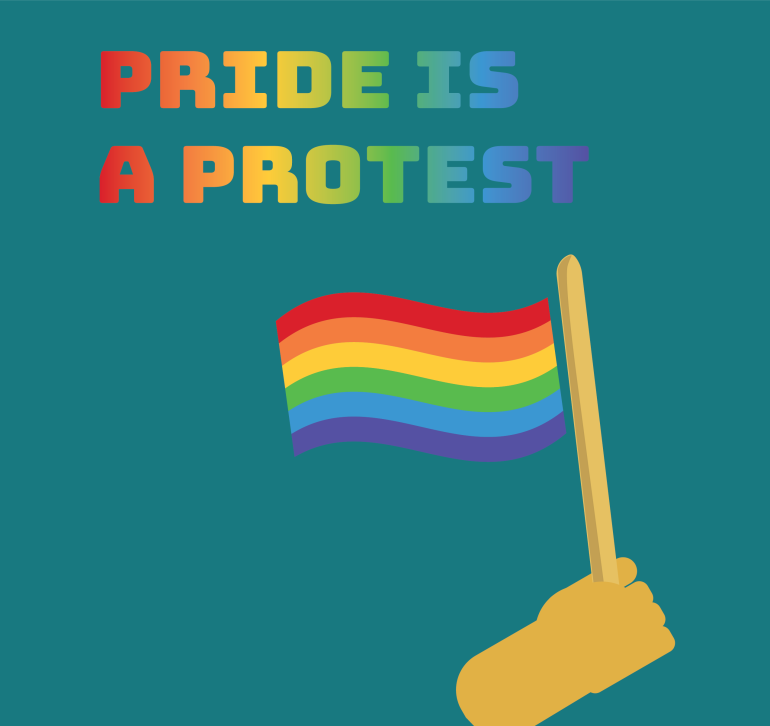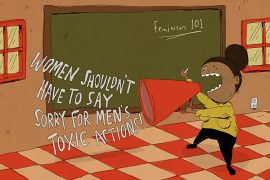June 2024 marks the 54th year of Lesbian, Gay, Bisexual, Transgender, and Queer (LGBTQ+) Pride Month. Beginning a year after the Stonewall Riots in 1969, Pride is unyielding in the millions who celebrate LGBTQ+ equality today. Remembering our history, I’d like to emphasize the power of unapologetic expression in gender and sexuality. By uplifting the voices of LGBTQ+ stories, perspectives, and expressions, Pride Month gives us an opportunity to persist in the work of activists such as Marsha P. Johnson and Sylvia Rivera by remembering their legacy. According to the Library of Congress, Pride is recognized and celebrated globally in advocating for equal rights. Throughout the month of June, communities organize “pride parades, picnics, parties, workshops, symposia and concerts” to encourage Pride celebration and open LGBTQ+ expression. Along with these events, “Memorials are held during this month for those members of the community who have been lost to hate crimes or HIV/AIDS. The purpose of the commemorative month is to recognize the impact that lesbian, gay, bisexual and transgender individuals have had on history locally, nationally, and internationally.”
With that being said, I’d like to bring attention to the political significance of Pride Month to acknowledge the resistance over 50 years ago and its legacy in advocating for continued LGBTQ+ pride.
Alyson Morris, a queer PSU student stated, “I think the fact that pride is still considered a protest makes it clear how our identities are viewed by the higher powers in our government. Pride is first and foremost a celebration of the community and aims to bring focus to inequalities that LGBTQ people still face. I definitely think this is relevant because being against the norm is still stigmatized in many ways, and LGBTQ identities are linked so heavily to the political policies that keep us from living safe and fulfilling lives.”
The American Civil Liberties Union (ACLU) is tracking 515 Anti-LGBTQ laws and their current status in legislative bodies across the country. “While not all of these bills will become law, they all cause harm for LGBTQ people.” Seeing the ACLU’s extensive data on each bill in every state, we can view the severity of conservative politicians attempting to use policy to disenfranchise LGBTQ+ people’s rights to life. These bills include restricting people’s access to healthcare, enforcing discriminatory school curriculum, banning books, and criminalizing LGBTQ+ people. Albeit more desperate, these policies are not unprecedented in American history. Anti-LGBTQ+ legislation, rhetoric, and hate crimes are the reasons we hold Pride Month as an annual tradition to continue recognizing LGBTQ+ freedom and history.
George Chauncey, a history professor at Columbia University who specializes in American LGBTQ history, describes the deep-rooted anti-LGBTQ+ history of the United States in his book “Gay New York: Gender, Urban Culture, and the Making of the Gay Male World, 1890-1940”. Throughout this book, Chauncey identifies how LGBTQ+ people gained undeniable public visibility and the measures morality-driven organizations took against them in 19th-century New York. The United States has a long history of LGBTQ+ discrimination as described by Chauncey’s research including censorship, threats to employment, housing discrimination, criminalization, widely publicized hate rhetoric, legal discrimination, threats to healthcare access, police brutality, anti-LGBTQ+ legislation, and the list goes on. The type of legislative action, demonizing rhetoric, and extreme censorship we are witnessing as of the writing of this article isn’t a new phenomenon.
Before LGBTQ+ rights were decriminalized in the U.S., especially in the 1920s, morality-driven organizations enforcing LGBTQ+ discrimination such as the Committee of Fourteen performed gay nightclub raids and the censorship of “immoral content” in the media. Elaborating on the nature of “immoral content” that would be censored included any speech that portrayed LGBTQ+ people in a potentially humanizing way. During moral censorship purges such as the ones conducted by Committee Fourteen, magazines and publications could be shut down for promoting advocacy of LGBTQ+ rights. In some cases such as Eve Adams, a Polish-Jewish lesbian author, who ran a beloved community tearoom for lesbian women in Greenwich Village known as “Eve’s Hangout.” As the tearoom gained popularity, Committee Fourteen raided “Eve’s Hangout” and had the club shut down upon the arrest of Eve Adams. According to the NYC LGBT Historic Sites Project, due to Adams’ promotion of what was deemed immoral behavior, Adam “was convicted of obscenity and disorderly conduct, which resulted in her deportation” from the U.S.
Morris remarks, “The political climate of the United States has never been safe and the greater visibility queer and trans people hold has created louder pushback in legislation.”
With this history in mind, Pride also represents a time to reflect on current political and social issues impacting the LGBTQ+ people. Many use Pride Month to spread awareness and advocate against hateful rhetoric still present in our society. It’s a long-time tradition to honor the history of those who fought for equality and remember to carry this legacy into our future. Unfortunately, there are instances where Pride celebrations and remembrance are exploited for profit.
According to an article published by the National Women’s Law Center, “The Real Costs of Rainbow Capitalism,” corporations often use Pride Month to their advantage to advertise performative LGBTQ+ activism through their products. This common phenomenon is known as “rainbow capitalism,” and its presence in a month dedicated to LGBTQ+ celebration is more harmful than it may appear. The article describes, “While Pride is rooted in revolution and resistance, rainbow capitalism packages our identities to turn a profit, flattening both the trauma and violence” LGBTQ+ people experience. The authors of this article even remark on how this devalues the true meaning of Pride Month by overshadowing the voices of LGBTQ+ people and denying a potential for real activism in the LGBTQ+ rights movement. Corporations often create merchandise specific for Pride Month but neglect larger issues they refuse to address. These include not hiring LGBTQ+ people and businesses to have a say in the merchandise these companies attempt to pass on as a sign of allyship. While some are beginning to recruit LGBTQ+ artists and businesses for Pride Month related products, many companies choose not to. The main problem is that choosing not to include LGBTQ+ people in spaces supposedly catering to them is actively removing LGBTQ+ people from conversations about Pride Month.
The issue behind rainbow capitalism is not only rooted in its efforts to influence consumerism with performative activism. Rainbow capitalism actively works to distract from LGBTQ+ voices and efforts to dismantle the harmful practices of corporations who in addition to removing LGBTQ+ people from conversations, contribute to anti-LGBTQ+ policies with donations, which today fund the 515 bills proposed to dismantle equal rights and protections.
For this article, I wanted to emphasize the voices of queer people and their perspectives on pride month to return to the core of its significance. Pride month began as a protest during the 1969 Stonewall Riots where around 200 people who identified with the LGBTQ+ community participated in a six-day protest for equitable rights. According to Colleen Walsh’s article, “Harvard Scholars Reflect on the History and Legacy of the Stonewall Riots”, this event occurred after police raided the Stonewall Inn which brought refuge to this community. The work of LGBTQ+ activists such as Marsha P. Johnson fought against discriminatory social norms unapologetically, knowing they’d be subjugated to brutality by law enforcement. Their work should inspire us to celebrate Pride Month and honor the legacy of the LGBTQ+ community. By claiming the term “pride,” the LGBTQ+ community established celebration as a form of protest from harmful rhetoric and social norms attempting to shame members of the community.
“I found it really isolating to be constantly surrounded by people who didn’t understand this central part of my identity,” Morris remarked on the nature of self-acceptance and expression as a queer person. They stated, “Being confident in myself and the way I feel has helped me find a greater acceptance of my identity and has helped me reach out and find community. I think living in Portland has allowed me to see so much queer expression and joy that it inspires me to live more outwardly as myself.”
With that being said, Pride Month is a protest for LGBTQ+ expression in a society that has historically silenced communities. By encouraging belonging and joy in LGBTQ+ identities, the legacy of equal rights advocates is still alive in celebration. Today, the Stonewall Inn is recognized as a national monument due to its historical significance in achieving LGBTQ+ rights in the U.S. As we acknowledge LGBTQ+ pride as a protest, I’d recommend we take pride in our resistance to hate all year round rather than restraining it to June. Even though Pride Month is a unique time to recognize essential work for equal rights, we can continue to protest and uplift unapologetic voices expressing pride in their stories.





